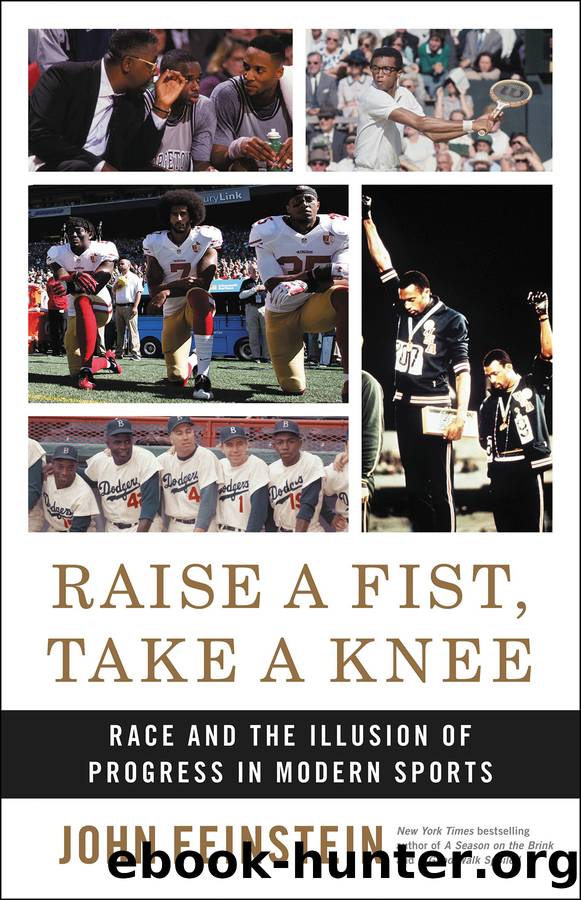Raise a Fist, Take a Knee by John Feinstein

Author:John Feinstein [Feinstein, John]
Language: eng
Format: epub
Published: 2021-11-16T00:00:00+00:00
CHAPTER EIGHT
Dreamers
GEORGE RAVELING IS A HISTORIC FIGURE in the sport of basketball. He is in the Naismith Basketball Hall of Fame and the College Basketball Hall of Fame. He was the first Black head coach hired by a school in what was then the Pacific-8 (now the Pacific-12) when Washington State made him the coach in 1972 at the age of thirty-four. He took the school to its first two NCAA Tournaments since 1941âthe third year the then eight-team tournament was heldâand then went on to success at Iowa and the University of Southern California.
Being elected to the two Halls of Fame might be at the top of Ravelingâs résumé, and his being one of the first Black coaches hired at a power-five school is also right near the top of that résumé. But the thing he is likely to be most remembered for has nothing to do with basketball.
Among Ravelingâs many treasured possessions is one that stands out from the rest: he owns the typewritten notes from Martin Luther Kingâs âI Have a Dreamâ speech, arguably the most famous and important speech of the twentieth century.
King gave the speech on August 28, 1963, as part of a massive March on Washington for Jobs and Freedom rally that had been organized to show support for civil rights legislation introduced by President John F. Kennedy.
Raveling had grown up in Washington, D.C., and had driven down that Sunday morning with some friends from Philadelphia, where he was working as an assistant basketball coach at Villanovaâhis alma mater.
âWe were walking around on the mall a few hours before the speech,â he said. âSeveral people working for Dr. King came up to us and said they were looking for some guys willing to volunteer to provide extra security for him. I was six foot four by then, and my friends were big guys too, so I guess thatâs what they were looking for. Of course, we said weâd do it. Next thing I know, a few hours later, Iâm standing behind Dr. King on the steps of the [Lincoln] Memorial while heâs speaking to 250,000 people.â
Nowhere in the typed version of the speech do the words âI have a dreamâ appear. King began the speech by referring to the fact that Abraham Lincoln had signed the Emancipation Proclamation almost exactly one hundred years earlier and then said, âOne hundred years later, the Negro is still not free.â
It was not until later in the speechâwhich lasted about seventeen minutesâafter famed gospel singer Mahalia Jackson yelled, âTell them about the dream, Martin!â that King began to say, âI have a dream,â which became the words that defined the speech, the day, and the Civil Rights Movement.
Initially, he said, âEven though we face the difficulties of today and tomorrow, I still have a dream.â He then repeated the words âI have a dreamâ eight more times.
âI still get chills almost sixty years later thinking about that moment,â Raveling said. âA few minutes later, he finished, and when he turned to leave, I noticed heâd left the notes behind.
Download
This site does not store any files on its server. We only index and link to content provided by other sites. Please contact the content providers to delete copyright contents if any and email us, we'll remove relevant links or contents immediately.
Harry Potter and the Goblet Of Fire by J.K. Rowling(3020)
Unfinished: A Memoir by Priyanka Chopra Jonas(2911)
Never by Ken Follett(2866)
The Man Who Died Twice by Richard Osman(2287)
Machine Learning at Scale with H2O by Gregory Keys | David Whiting(2254)
Fairy Tale by Stephen King(2056)
Will by Will Smith(2026)
Rationality by Steven Pinker(1758)
The Storyteller by Dave Grohl(1653)
The Dawn of Everything: A New History of Humanity by David Graeber & David Wengrow(1563)
The Dark Hours by Michael Connelly(1557)
The Stranger in the Lifeboat by Mitch Albom(1522)
Cloud Cuckoo Land by Anthony Doerr(1423)
The Becoming by Nora Roberts(1322)
Friends, Lovers, and the Big Terrible Thing by Matthew Perry(1315)
Einstein: His Life and Universe by Walter Isaacson(1308)
Crying in H Mart by Michelle Zauner(1306)
A Short History of War by Jeremy Black(1295)
New Morning Mercies: A Daily Gospel Devotional by Paul David Tripp(1292)
